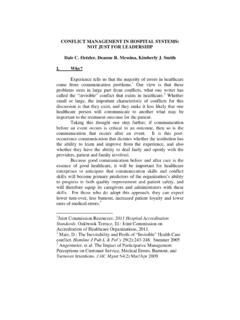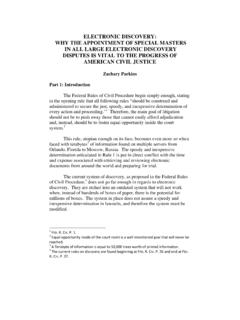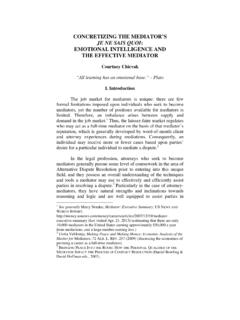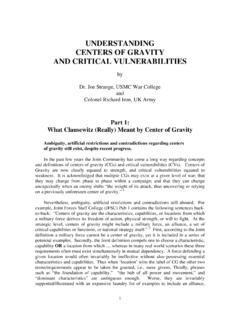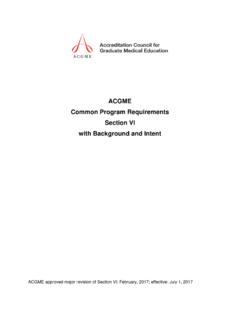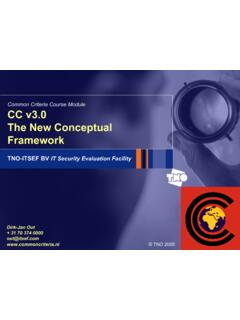Transcription of AVOIDING PITFALLS: COMMON REASONS FOR …
1 AVOIDING pitfalls : COMMON REASONS FOR MEDIATION FAILURE AND SOLUTIONS FOR SUCCESS1 Jack G. Marcil2 and Nicholas D. Thornton3 I. INTRODUCTIONi In mediation, the primary focus of the mediator is to encourage the disputants to communicate with each other concerning the Without an effective channel of communication between the disputants and a commitment to resolve the matter, mediation will most likely fail. When mediation sessions are not going well, disputants often feel discouraged, frustrated or disenchanted, 1 The authors would like to extend special thanks to their families for providing support and encouragement and the members of the North Dakota Law Review who helped prepare this article for publication.
2 2 Managing Partner, Serkland Law Firm, Fargo, North Dakota. , University of North Dakota School of Law, 1968; , University of North Dakota, 1963. Marcil is a qualified neutral in Minnesota under Rule 114 of the Minnesota General Rules of Practice (civil facilitative/hybrid and civil adjudicative/evaluative), and he is a qualified civil mediator and arbitrator under rule of the North Dakota Rules of Court. In 2007, Marcil became a Fellow of the American College of Civil Trial Mediators. Marcil is one of only two Fellows in North Dakota and Minnesota.
3 Marcil has mediated over 1,300 disputes, and he is a frequent speaker on arbitration and mediation. He focuses his ADR practice on personal injury, wrongful death, professional malpractice, products liability, construction law, and insurance coverage cases. 3 Public Defender, North Dakota Commission on Legal Counsel for Indigents, Fargo, North Dakota. , University of Mary, 2008; , North Dakota School of Law, 2006; , Minnesota State University Moorhead, 2003. Thornton is a qualified neutral in Minnesota under Rule 114 of the Minnesota General Rules of Practice (civil facilitative/hybrid), and he is a qualified civil mediator in North Dakota under Rule of the North Dakota Rules of Court.
4 The views and opinions expressed herein are those of the authors only. As such, the views and opinions should not be construed as the position or opinion of the Serkland Law Firm or the North Dakota Commission on Legal Counsel for Indigents. 4 See R. CT. (a)(1)(A) (defining mediation as an alternative dispute resolution process in which a non-judicial neutral mediator facilitates communication between parties to assist the parties in reaching voluntary decisions related to their dispute ); see also DWIGHT GOLANN, MEDIATING LEGAL DISPUTES: EFFECTIVE STRATEGIES FOR LAWYERS AND MEDIATORS , at 39 (1996) (noting that the mediator s overall goal in mediation is to stimulate constructive negotiations ).
5 Which may lead the disputants to either act more obstinately towards each other or to withdraw altogether from the mediation. This article discusses fifteen COMMON REASONS that some mediations are unsuccessful, and, in the authors view, methods in which those problems may be avoided. While some may criticize this unscientific analysis,5 this article provides pragmatic advice based on practical, real world This article is not intended to provide an exhaustive statement of REASONS why mediations might fail. After decades of research on mediation and other alternative dispute resolution processes, it still remains unclear why some cases reach settlement and others do However, based on the authors practical experience,8 the goal of this article goal is to identify COMMON causes of mediation failure, discuss methods that the authors have found useful to avoid or overcome those problems, and to share 5 See, , Russell Korobkin, Psychological Impediments to Mediation Success.
6 Theory and Practice, 21 OHIO ST. J. ON DISP. RESOL. 281, 281 (2006) (noting that practice-oriented mediation literature can suffer from reliability and representativeness problems in that the observations of the author might be idiosyncratic, biased, or otherwise different from others in the author s position, and that small numbers of anecdotal information might be idiosyncratic and their lessons not broadly generalizable ). 6In general, mediators are required to maintain the confidentiality of anything relating to a mediation.
7 See, , R. CT. (d) (North Dakota s general confidentiality rule); MINN. GEN. R. PRAC. (Minnesota s general confidentiality rule). But see, , CENT. CODE 31-04-11 (2007) (providing that certain information disclosed in mediation is admissible and may be compelled by subpoena in a subsequent civil proceeding); CENT. CODE (providing that any communication in a contested child proceeding mediation is confidential, inadmissible, and not subject to compulsion by subpoena); MINN. GEN. R. PRAC. (providing exceptions to the general confidentiality rule).
8 Any examples used in this article will be generalized or fictionalized to maintain confidentiality. 7 See Douglas A. Henderson, Mediation Success: An Empirical Analysis, 11 OHIO ST. J. ON DISP. RESOL. 105, 105 (1996). 8 The authors experiences are primarily drawn from mediations in cases involving contracts or torts where the disputants have little interest in preserving a relationship. The COMMON causes of mediation failure discussed here may not be applicable to situations. those tools with other mediators, attorneys, and disputants to provide them with the best opportunity for a successful II.
9 COMMON CAUSES OF MEDIATION FAILURE AND SOLUTIONS FOR SUCCESS No matter what one calls it impasse, deadlock, stalemate, standoff, standstill reaching a point in a mediation where the disputants are either unable or unwilling to communicate with each other and to reach a mutually acceptable resolution of their dispute can be a obstacle in every mediation. Depending on its severity, impasse may result in obstinate behavior of the disputants, or in the disputants terminating all options short of full-blown litigation.
10 Impasse might arise from the mediation process itself,10 some psychological impediment to a successful mediation,11 or some barrier concerning the merits of the 9 The authors recognize that successful mediation is a malleable term and that each dispute has unique characteristics. In one instance, merely getting the disputants in the same place at the same time for a mediation session might be considered a successful mediation. In other situations, the disputants might define a successful mediation as nothing short of reaching full and complete settlement of the entire matter.

